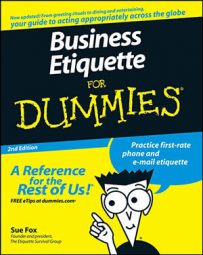Parts of Africa have seen tremendous business growth, so you may have an African business trip in your future. Africa is so huge, so diverse, so complicated, and so rich that almost nothing can be said about shared etiquette across the continent. Here are a few general customs, however:
The northern countries bordering the Mediterranean are Islamic. The lavish generosity, indirect business discussions, expansive sense of time, and second-class-citizen status for women common to Arabic countries are common in these countries, too.
In Muslim countries, don’t eat with your left hand, which is symbolically tainted. Watch your hosts in other countries for similar taboos. When in doubt, do as your host does.
In the countries with colonial pasts, inroads of European etiquette have occurred. Not surprisingly, these inroads follow the particular country’s colonial affiliation. You’ll see some English manners in Kenya and Nigeria, Dutch manners in various parts of South Africa, and Portuguese manners in Cape Verde.
Soft handshakes are common across Africa. In countries with large postcolonial populations, such as Kenya and South Africa, expect European-style handshakes. In the Muslim countries of northern Africa, such as Morocco, you may find men holding handshakes so long that they become handholds. Don’t be offended; this practice is common.
Conservative is the keyword for business attire. In particularly hot countries, some easing up on the dark business suit is permitted. Your host won’t be bound to Western dress, of course; he may show up in dressy traditional attire.
Africans are justly famous for eating, entertaining, and generosity. If you’re invited to someone’s home almost anywhere in Africa, be prepared: Your host will go all out to impress and please you.

